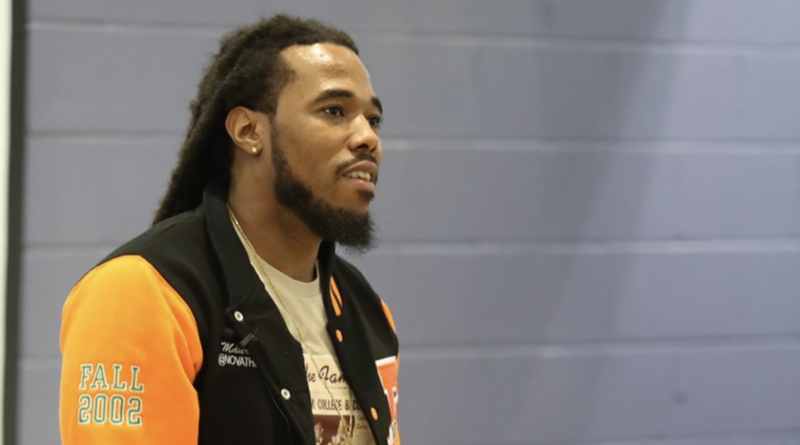FSU Professor Maurice Johnson Uses Hip Hop as His Textbook

Florida State University Professor Maurice Johnson teaches his students about Black history, society and culture through the lens of Hip Hop. In his Hip Hop Culture and Global Mass Communication class, Johnson discusses the social and political issues in the Black community through various mediums including songs like “The Message” by Grandmaster Flash and The Furious Five or films like Boyz in the Hood.
Johnson pulls the inspiration for this course from his own HBCU experience at Florida A&M University. He was an MC while his friends were DJ’s for the college radio station, The Flava Station. He went on to pursue his graduate degree at FSU where he explored Hip Hop culture in his Master’s Thesis: “A Historical Analysis: The Evolution of Commercial Rap Music.”
Johnson returned to FAMU as a professor in their School of Journalism and Graphic Communication form 2011 to 2021. He created a First Year Experience course at FAMU in 2021 titled “Tupac Shakur: Popular Culture, Politics and Social Justice” using the artist’s lyrics as the text for the class.
Upon joining the FSU faculty, his idea of utilizing Hip Hop culture to discuss theories of mass communication was met with great support. However, Johnson felt a transition going from teaching at an HBCU to a predominately white institution (PWI).
“Being in Florida and you have a governor that supports a bill that doesn’t allow educators to make white people feel uncomfortable, it empowers children and young adults to be less tolerant. I feel like the culture can be used as a connector provided it’s taught in the proper context. Everybody can’t teach about Hip Hop,” said Johnson.
G/O Media may get a commission
Johnson also said even though white people are consumers of Hip Hop and Black culture, they don’t necessarily love or value Black people. That is why it’s important for students to remember his class isn’t just about listening to music but about understanding the socioeconomic and political issues discussed within it.
“If we’re talking about NWA addressing police brutality with ‘F*ck The Police’ and you have a family member that’s in law enforcement in the heroic image of police officers that you grew up with may not necessarily correlate with the information that I’m giving in class and there may be some backlash,” Johnson said. “But at the same time I have students who come up to me after class everyday or send me emails like ‘Man I appreciate this so much. I wouldn’t have known any of this if I hadn’t taken his class.’”
Johnson noted that since the birth of Hip Hop culture in the Bronx Borough, the music has often reflected the reality and social issues of the Black community such as the crack cocaine epidemic in the 80s. Sometimes, that reality is weaponized against the artist and, lately, used as evidence. Johnson said the use of media to criminalize Black men isn’t anything new, citing the previous obscenity lawsuit against 2 Live Crew.
“I don’t think that they care to take into context that these artists may be speaking from an observatory perspective as opposed to a participatory perspective,” said Johnson. “If you’re not culturally competent it’s easy to misconstrue what’s being said. If you’re a suburban white parent and you hear ‘thug life’ you’re going to think of a thug living a particular way of life. You’re not going to think about the acronym, The Hate U Give Little Infants F*cks Everyone,” said Johnson.
Johnson also uses film to engage students on issues and themes such as systemic racism. The materials Johnson pulls for his class date back all the way to Birth of a Nation from 1915. For example, one semester Johnson showed students movies from the blaxploitation era such as Mandingo to showcase the first Black protagonists on screen. Then, he pulled from some of our most popular films from the “hood movie era” like Menace II Society to discuss the Black issues prevalent in the 90s.
Now he wants to show that the messages found in Hip Hop culture expands beyond the classroom. Currently, he’s presenting a study, Beats, Rhymes and Life: A Testimonio of Hip Hop as Collective Leadership in P-20 Schools, at the American Educational Research Association Annual Meeting in San Diego. With co-presenters Dr. Asif Wilson from University of Illinois Urbana-Champaign and Dr. Vanessa Ochoa of East Los Angeles College, he will present the research of how students interacted with Hip Hop media in his FAMU First Year Experience course.
Johnson is also obtaining his Ph.D. at FAMU College of Education in educational leadership, researching how school leaders interact with Hip Hop culture and how using it in the classroom impacts student engagement and academic achievement.

